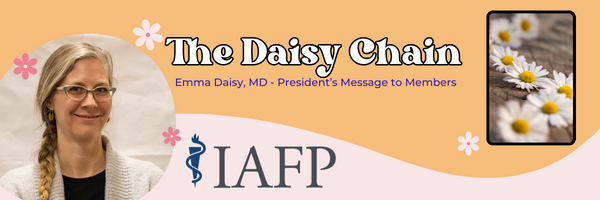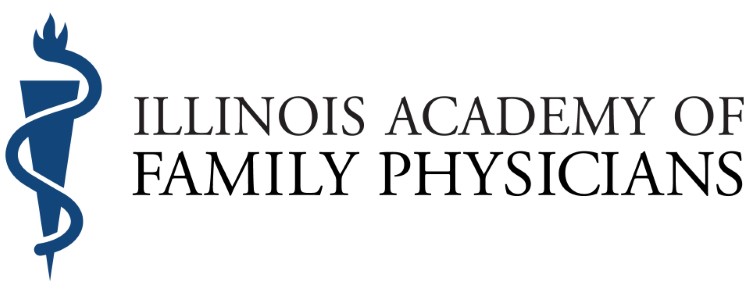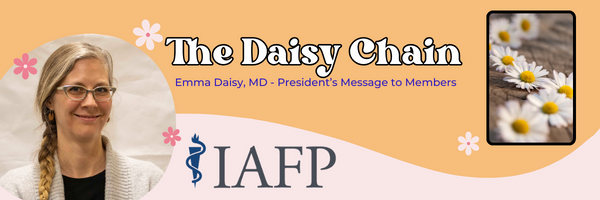It’s National Doctors' Day: Family Medicine Must be Anti-Racist in All Aspects of Medicine
We know that disparities in health outcomes according to race/ethnicity are based not in biology but in the inequitable distributions of money, power, and opportunity due to geography, culture, race, and broader sociopolitical forces. Our state government recently acknowledged this through The Healthy Illinois 2028 State Health Improvement Plan, which declared racism as a public health crisis.
Healthy Illinois 2028 provides goals, objectives, and recommended strategies to address these challenges:
1. We must declare racism as a public health crisis in Illinois with an actionable plan that outlines specific and measurable activities and strategies.
2. Explore mechanisms to create a formal advisory committee that may inform policy and guidance that is comprised of public, private, and voluntary community representatives, geographically representative of the state, centered on those most impacted by racism and oppressive systems and includes funding to compensate participating members.
3. Review current policies (both public and organizational/institutional) that perpetuate oppressive systems and leverage policy to advance health and racial equity and dismantle oppressive systems and make recommendations for revisions through the appropriate channels such as legislative change.
I commend this step forward by our state, as this is an essential issue in all of healthcare. On this National Doctors’ Day, I would like to highlight some of the work the American Academy of Family Physicians (AAFP) and Illinois Academy of Family Physicians (IAFP) have been doing in this realm.
Diversity Matters: Patient Outcomes and Trust
Studies consistently demonstrate that diverse healthcare teams yield better patient outcomes. When patients encounter providers who share their cultural background, race, or language, trust and communication flourish and health improves. In pursuit of improving outcomes for minority communities, AAFP has developed several initiatives aimed at fostering diversity within the family physician workforce, including the Doctors Back to School Program, the Ladder Program, and the Tour for Diversity in Medicine. These programs expose students at early stages in their education to family physician role models and career mentors, with the goal of creating a stronger ladder for minority students to climb into careers in family medicine.
IAFP members work directly to inspire students through in-depth conversations about family medicine for their Future Health Professionals competitions in Illinois high schools. And our annual summer externship program provides an in-depth positive and unique family medicine experience to three medical students over four weeks in the summer.
Education tools for change
While racism is all around us, we have plenty of opportunities for anti-racism, and have tried to harness the activities of our organization to create more welcoming spaces. AAFP developed the EveryOne Project, a multi-pronged approach to improving health equity, and has CME opportunities including the Anti-Racism Tools for Change.
At IAFP, an ongoing recruitment effort from the education department strives for balance in our speakers, subject matter experts, and faculty. We have also used the mandated CME requirements of our state in Implicit Bias, Sexual Harassment, and Cultural Competency to address these issues in a meaningful way as they relate to family medicine. But we can do better and we want your input. Since 2022, a question is included in all new CME activity evaluations asking how well we have addressed diversity within the programming.
Additionally, our Member Interest Groups (MIGs) create organic opportunities for leadership and mentorship, since they are member-driven and open to all members, including students. Any Active member can propose a MIG on any topic, provided there is enough interest within the membership to support it. These MIGs are great opportunities for networking, mentorship, and building leadership skills.
While the COVID pandemic’s lack of in-person gatherings made personal connections difficult, we are fully committed to in-person gatherings whenever possible, giving our members renewed opportunities to engage with each other and with leaders.
|
Empowerment and Leadership: the voice at the top
When underrepresented individuals witness someone with whom they can identify thriving at the top of their field, it sends a powerful message of “You belong here.” Having diverse faces in leadership is not just empowering, but can also foster a broader dialogue through diversity of ideas. Inclusion can create a safer space to share ideas, giving voice to perspectives that might otherwise be lost. This is especially important in leadership, where the culture of an organization is determined. Both AAFP and IAFP have committed to improving the diversity in our leadership to better reflect membership. At IAFP, we aim for our IAFP board of directors to represent our academy’s diversity of racial background and also in educational training, practice environment, and gender identity/sexual orientation. With diverse leadership, we hope to amplify ideas and perspectives.
Anti-racism: a tool for everyone
At IAFP, we recognize that our commitment to anti-racism extends beyond individual actions—it encompasses our practice of medicine and how we run our academy. Every decision we make has the opportunity to be anti-racist, and we want to promote an anti-racist mindset within our organization. Our policy on Diversity, Equity, and Inclusion reads, “IAFP will support diversity, equity, and inclusion in all of its forms, recognizing that these require an enduring commitment that must find full expression in our organizational culture, values, activities and behaviors.” This is a tall order, but we hope that this can be achieved through a culture and practice of anti-racism. I’m grateful for the countless colleagues and friends I have in IAFP and AAFP who are leaders in this arena.
|
I realize that I may not be the face of diversity but I am committed to addressing racism in health care and in our academy, and I strive to be a voice for diversity and inclusiveness as we work towards change. I invite your input into how our academy can do better. You can email me at the President's email address.
This National Doctor’s Day (March 30) let's celebrate the hard work of today’s and tomorrow’s family physicians who are working to create a more just and equitable practice of medicine.
|
|
\

March 30, 2024 - It’s National Doctor’s Day: Family Medicine Must be Anti-Racist in All Aspects of Medicine.
We know that disparities in health outcomes according to race/ethnicity are based not in biology but in the inequitable distributions of money, power, and opportunity due to geography, culture, race, and broader sociopolitical forces. Our state government recently acknowledged this through The Healthy Illinois 2028 State Health Improvement Plan, which declared racism as a public health crisis.
Healthy Illinois 2028 provides goals, objectives, and recommended strategies to address these challenges:
1. We must declare racism as a public health crisis in Illinois with an actionable plan that outlines specific and measurable activities and strategies.
2. Explore mechanisms to create a formal advisory committee that may inform policy and guidance that is comprised of public, private, and voluntary community representatives, geographically representative of the state, centered on those most impacted by racism and oppressive systems and includes funding to compensate participating members.
3. Review current policies (both public and organizational/institutional) that perpetuate oppressive systems and leverage policy to advance health and racial equity and dismantle oppressive systems and make recommendations for revisions through the appropriate channels such as legislative change.
I commend this step forward by our state, as this is an essential issue in all of healthcare. On this National Doctors’ Day, I would like to highlight some of the work the American Academy of Family Physicians (AAFP) and Illinois Academy of Family Physicians (IAFP) have been doing in this realm.
Diversity Matters: Patient Outcomes and Trust
Studies consistently demonstrate that diverse healthcare teams yield better patient outcomes. When patients encounter providers who share their cultural background, race, or language, trust and communication flourish and health improves. In pursuit of improving outcomes for minority communities, AAFP has developed several initiatives aimed at fostering diversity within the family physician workforce, including the Doctors Back to School Program, the Ladder Program, and the Tour for Diversity in Medicine. These programs expose students at early stages in their education to family physician role models and career mentors, with the goal of creating a stronger ladder for minority students to climb into careers in family medicine.
IAFP members work directly to inspire students through in-depth conversations about family medicine for their Future Health Professionals competitions in Illinois high schools. And our annual summer externship program provides an in-depth positive and unique family medicine experience to three medical students over four weeks in the summer.
Education tools for change
While racism is all around us, we have plenty of opportunities for anti-racism, and have tried to harness the activities of our organization to create more welcoming spaces. AAFP developed the EveryOne Project, a multi-pronged approach to improving health equity, and has CME opportunities including the Anti-Racism Tools for Change.
At IAFP, an ongoing recruitment effort from the education department strives for balance in our speakers, subject matter experts, and faculty. We have also used the mandated CME requirements of our state in Implicit Bias, Sexual Harassment, and Cultural Competency to address these issues in a meaningful way as they relate to family medicine. But we can do better and we want your input. Since 2022, a question is included in all new CME activity evaluations asking how well we have addressed diversity within the programming. Additionally, our Member Interest Groups (MIGs) create organic opportunities for leadership and mentorship, since they are member-driven and open to all members, including students. Any Active member can propose a MIG on any topic, provided there is enough interest within the membership to support it. These MIGs are great opportunities for networking, mentorship, and building leadership skills. While the COVID pandemic’s lack of in-person gatherings made personal connections difficult, we are fully committed to in-person gatherings whenever possible, giving our members renewed opportunities to engage with each other and with leaders.
Empowerment and Leadership: the voice at the top
When underrepresented individuals witness someone with whom they can identify thriving at the top of their field, it sends a powerful message of “You belong here. ”Having diverse faces in leadership is not just empowering, but can also foster a broader dialogue through diversity of ideas. Inclusion can create a safer space to share ideas, giving voice to perspectives that might otherwise be lost. This is especially important in leadership, where the culture of an organization is determined. Both AAFP and IAFP have committed to improving the diversity in our leadership to better reflect membership. At IAFP, we aim for our IAFP board of directors to represent our academy’s diversity of racial background and also in educational training, practice environment, and gender identity/sexual orientation. With diverse leadership, we hope to amplify ideas and perspectives.
Anti-racism: a tool for everyone
At IAFP, we recognize that our commitment to anti-racism extends beyond individual actions—it encompasses our practice of medicine and how we run our academy. Every decision we make has the opportunity to be anti-racist, and we want to promote an anti-racist mindset within our organization. Our policy on Diversity, Equity, and Inclusion reads, “IAFP will support diversity, equity, and inclusion in all of its forms, recognizing that these require an enduring commitment that must find full expression in our organizational culture, values, activities and behaviors.” This is a tall order, but we hope that this can be achieved through a culture and practice of anti-racism.
I’m grateful for the countless colleagues and friends I have in IAFP and AAFP who are leaders in this arena. I realize that I may not be the face of diversity but I am committed to addressing racism in health care and in our academy, and I strive to be a voice for diversity and inclusiveness as we work towards change. I invite your input into how our academy can do better.
This National Doctor’s Day (March 30) lets celebrate the hard work of today’s and tomorrow’s family physicians who are working to create a more just and equitable practice of medicine.
|







